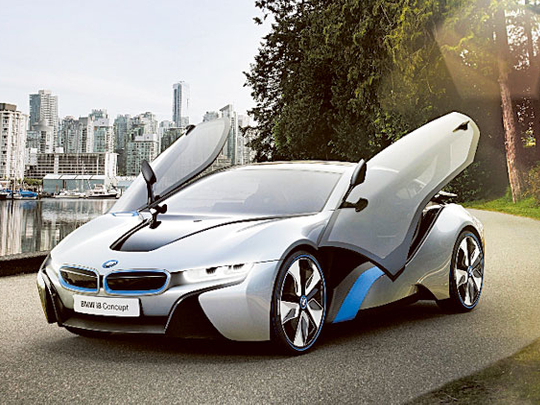
Dubai: All they needed was just the right push. Hybrids, after a slow start, are finally making it to the highways and by-lanes in the region.
Hyundai has just introduced the hybrid version of its popular mid-size sedan — Sonata — in Jordan, while BMW will lift the veils on its i8 plug-in at the Frankfurt Motor Show in September and which will be commercially available in the UAE and elsewhere in the region from the second quarter of 2014.
“The i8 will have the sporting ability of a high-performance car with the fuel consumption and emissions of a small car,” said Leanne Blanckenberg, spokesperson at BMW Group Middle East. “The car will demonstrate how sportiness and low-emission mobility can deliver emotional excitement and driving pleasure.” (For its acclimatisation run ahead of the launch, the i8 has already made a few trips to this part of the world.)
Already, Porsche has a plug-in hybrid version of its hugely popular Cayenne with local buyers who want to do their bit for the environment or who just want to drive a car that is cut off a different combustion mould. Porsche will follow it up with the Panamera S E-Hybrid later in the year.
Then there is Toyota who has limited numbers of the Camry hybrid with the local taxi fleet.
But the steady turn up in volumes does not mean carmakers are raising their expectations all of a sudden of what hybrids can achieve in the region.
“We chose Jordan as our first Middle East market for the Sonata Hybrid as there is a growing demand for this type of car in the kingdom,” said a spokesperson at Hyundai’s regional office. “Hybrid models currently receive attractive tax breaks from the Jordanian government; so customers are increasingly aware of the financial as well as environmental benefits of buying hybrid models. Encouragingly, we are already selling around 100 Sonata Hybrids a month in the country.
“In line with Hyundai’s global pricing policy, customers buying a Sonata Hybrid in Jordan will pay the same as a customer in the model’s biggest market, the US, or in Hyundai’s home market of Korea.”
There are no plans to launch the model in other Middle East markets, “although we would review this situation if we believed that the appropriate demand was there”, the spokesperson added. Clearly, this will take time to build up... if at all.
BMW is taking a different approach with the i8, in that it will have pan-regional possibilities from the get-go. In prepping for the launch, there will be “extensive training across several areas of our business: sales, after-sales and marketing have already started to ensure that employees and our importer-partner employees are prepared,” said Blanckenberg.
“We anticipate customers in the Middle East will be mainly Arabs wanting to purchase a car that stands out from the crowd and makes a strong and different statement. In other parts of the world where there is high fuel cost or tax incentives to purchase eco-friendly vehicles, the purchasing decision will differ.”
Clearly, future demand for hybrids will be a slow burner.












